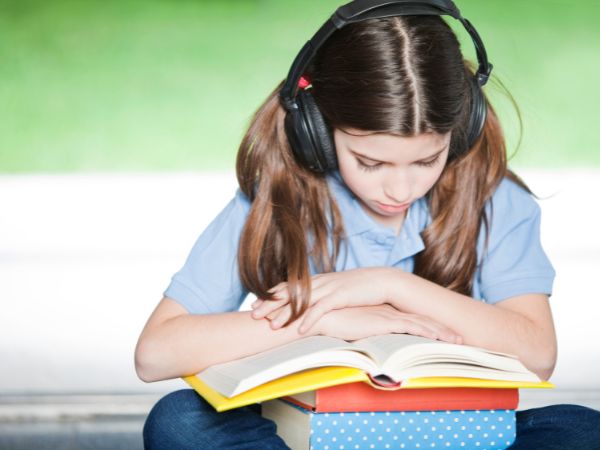Did you know that studying with music can transform your study sessions? Try some of these international playlists to boost your concentration and help your learning.
There you are, surrounded by a mountain of books and subjects to study, your eyes staring into space as your wandering mind point blank refuses to cooperate. Don’t worry, you’re not alone in this battle against distraction! Far from it.
You have a secret weapon you can use to your advantage: music. But it’s not quite as simple as just firing up any old playlist. No, if you choose the right music, you can effectively switch your brain into ON mode and transform into a study superhero!
In fact, to use music so it actually helps you study, you mustn’t merely stick on your favourite band in the background—you need to select, with care, those genres and tracks that turbocharge your memorisation power.
Indice dei contenuti
Learning with music: what the experts say
What we’re saying here is grounded in real research. The Stanford University School of Medicine didn’t stop at confirming what many have long claimed. No, these scientific luminaries discovered that certain melodies act like superconductors for your brain, enabling information to flow better than ever.

But beware: not all musical notes are created equal. Some can catapult you into a whirlpool of productivity, while others achieve the opposite… well, let’s just say you might find yourself grooving to the new TikTok dance trend instead of tackling algebra!
For example, listening to Mozart, lo-fi beats and even jazz can become your secret allies against that feared “mountain of homework”. We’re confident that once you’ve read this article, you’ll be ready to grab your headphones, tune your ears, and dive into a study session so long and productive it’ll make Odysseus’s famed voyage look like a stroll in the park.
The power of classical music for studying
The Mozart effect is a real thing. Scientific research has proven that certain types of music can indeed enhance our study capabilities, and today we know for certain that complex classical music activates multiple areas of the brain simultaneously. This “brain workout” helps us memorise information more effectively.
Melodies with a moderate tempo are particularly effective. They keep the brain engaged without distracting it, rather like a brisk walk that keeps your mind alert.

There is no doubt that instrumental music is the best choice for studying. Why? It’s simple: our brains don’t have to “compete” between song lyrics and study material.
As a result of this discovery, in Japan, some schools have started using classical music as background during lessons. Imagine solving algebra problems while Beethoven’s notes fill the classroom. It may sound odd, but the results speak for themselves: students display greater focus and improved learning outcomes.
Find your perfect study playlist
Creating the ideal study playlist requires the right balance of ingredients. Here are some tried-and-tested collections you can find on Spotify:
1) The Greatest Classics
Mozart never goes out of style. On Spotify, “This Is Mozart” offers a selection of his finest works for studying. If you’d rather feel like an unrecognised genius, try Wagner: his epic music might give you the drive to tackle even the toughest assignments.
2) Soothing Lo-Fi
Lo-fi hip-hop is helping students worldwide, and with its relaxed rhythms and repetitive melodies, it creates an ideal atmosphere for concentration. Search “Chill Lo-fi Study Beats” on Spotify to give it a try.

3) Jazz for ambience
Want to transform your desk into a Parisian café table? The “Jazz in the Background” playlist will turn your room into a sophisticated atmosphere, perfect for sparking creativity as you study.
4) Energetic instrumental
For those intense late-night study sessions when coffee just isn’t cutting it, try “Upbeat Instrumental Music”. These energising tracks will keep you awake and focused without any distracting lyrics.
5) Ready-made playlists
Spotify also offers a variety of curated playlists perfect for studying, ready to go:
- “Brain Food”: ideal for entering a flow state and making time fly during study;
- “Instrumental Study”: a selection of lyric-free tracks, perfect for concentration;
- “Deep Focus”: ambient and post-rock music for deep, enduring concentration;
- “Intense Studying”: piano pieces to help you zero in on the toughest concepts;
“Totally Stress Free”: excellent for kicking off your session and easing study-related anxiety.
Sounds that stimulate your mind
Music isn’t the only soundtrack for your study, and you may find you concentrate better with various types of sound, such as white noise. This constant, waterfall-like sound creates a bubble of focus around you, allowing you to fully concentrate on your studies.
Or you might prefer ASMR, those satisfying whispering sounds that ignite the mind. These gentle noises—from the rustle of pages to the pitter-patter of rain—can induce a deep calm and intense concentration. Though for some, it’s like guided meditation, so make sure you stay awake!

Finally, you could tune your brain to specific frequencies, much like you would a radio. Binaural beats use slightly different frequencies in each ear, and so they create a “third tone” in your mind. According to some studies, this can influence the behaviour of your brain waves, favouring focus or relaxation.
Is silence golden?
Yes and no. Because beyond expert opinion, don’t forget there’s no one-size-fits-all solution. Some people believe silence is the best study companion, and you might feel the same way! And that’s perfectly fine. The important thing is to experiment and discover what works for you.
Find your perfect mix
Remember: the perfect playlist is a personal matter. Experiment, blend different genres, and listen to what your brain tells you. With a bit of practice, you’ll discover the ideal soundtrack or playlist that help make your study sessions more productive and efficient!

And don’t limit yourself to Western music. Try adding instrumental pieces from various cultures to your playlist, as you might find that an Indian sitar helps you memorise Asian capitals, or African rhythms enliven your history reading!
Plus, if you don’t have Spotify or Apple Music, you can try and find some youtube playlists for a fun and free way to learn a new language.




